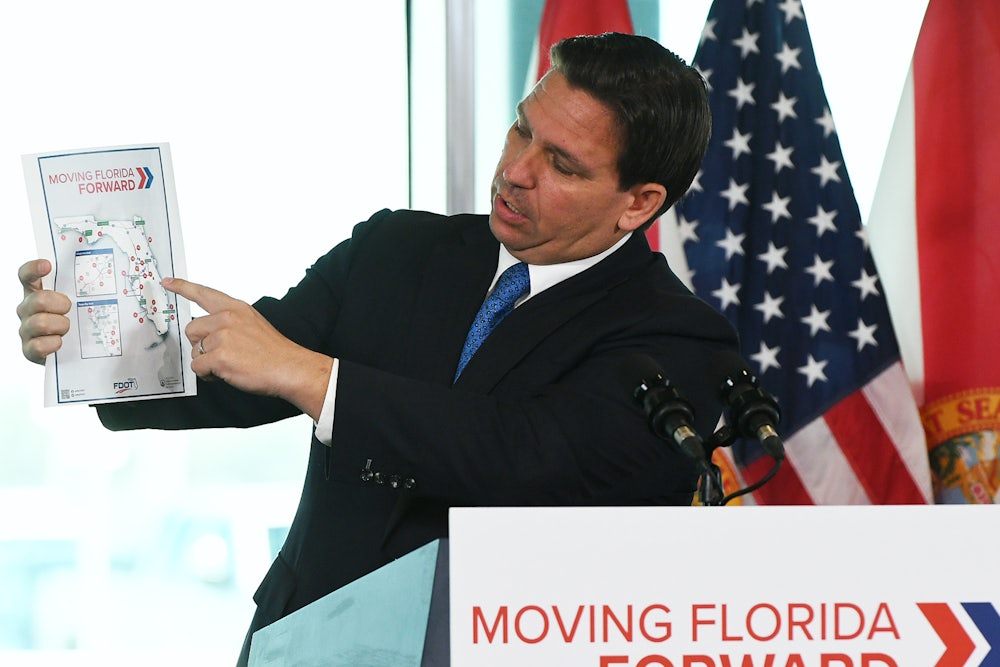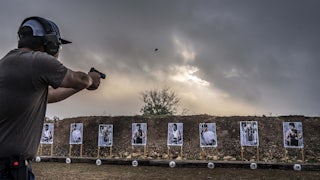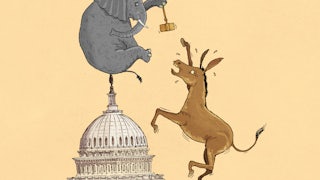After winning his reelection last fall by a wide margin—some 1.5 million votes—Ron DeSantis returned to the governor’s mansion in Tallahassee at the start of 2023 and ran with a presumed mandate behind his reactionary politics. He greeted his second term as a “war on woke” in his inaugural address, a vision of the state as he has remade it in his image or, at least, as a tool to build an image for himself. Over the following weeks, DeSantis would further underline his fascistic aims: proposing legislation to mandate all state institutions of higher education be “grounded in the history and philosophy of Western Civilization” and barring all diversity initiatives; backing a vague new rule that gives police the power to remove and charge with trespassing any “disruptive” protester from the state Capitol while the legislature is in session; and seeking to weaken legal protections for media, including defining allegations that any person is engaging in discrimination as slander.
Through this agenda, Ron DeSantis is clout-chasing Christian nationalism, aiming for a national profile that might contend with Donald Trump’s in their presumed showdown in next year’s Republican primaries. But interpreting his actions as primarily based on the points racked up or lost on the way to the White House plays into DeSantis’s goal, reducing millions of people living in Florida to a “Decision 2024” scorecard.
Amid this dangerous escalation, DeSantis has wanted it both ways: to be lauded for putting Florida in a Skinner box and calling it freedom and for the media to shy away from examining the ruinous results. He, like many of his GOP colleagues though to a higher degree, has abandoned governance in favor of amplifying grievances. For DeSantis, each new statement is another in a series of opening gambits for a national campaign. Yet his proclamations do not glide friction-free over his state. Yes, he really means it—and he’s already doing it.
The clearest place to see this dynamic is in DeSantis’s actions to seize control of education in Florida. The DeSantis administration is attempting to wrest decision-making on everything from higher ed curricula to kindergarten classroom libraries. At the same time, DeSantis and his allies insist they have not banned a single book. It’s a replay of how they tried to squash dissent over the Florida law dubbed “Don’t Say Gay” by claiming the text of the law said no such thing (and when that didn’t work, they likened their opposition to child abusers). The put-on is the point; his law leading to book banning in schools made noncompliance a felony and then made it nearly impossible to comply.
Once House Bill 1467 went into effect in July 2022, if an educator made books available that violated the law’s new standards, they could be criminally charged with a third-degree felony. But the state Department of Education only released a draft of these standards in January. Even then, those draft standards were left as vague directives, stating that books with “unsolicited theories that may lead to student indoctrination are prohibited.” Not only did this make buying books for the current academic year impossible, but if an educator left the books they did have on the shelves, they would be risking five years in prison, along with potentially losing their teacher certification.
Thanks to these inadequate directions, in January in Manatee and Duval counties, school officials told teachers to remove or cover their classroom libraries. The Manatee County teacher’s union advised its members to comply with the law. A Duval County teacher’s video of empty shelves went viral, and when DeSantis was confronted with it, he accused the teacher of spreading a “fake narrative”; days later, the teacher was fired. Over one million titles remain under review in Duval County alone. Thanks to DeSantis, Florida’s educators and library workers currently face a mirage of a choice: Whether they refuse or try to comply, they may lose their jobs anyway.
Even if those fearing a President DeSantis do not seize this moment, some of his worst (even if only occasional) allies already see its potential. When All Things Considered caught up with some neo-Nazis in Jacksonville in February, the group’s leader was enthusiastic about their allegedly growing numbers, telling NPR reporter Sergio Olmos, “We’ve just seen the largest upticks in recruitment from the drag stuff,” pointing to their “activism once a month” terrorizing drag events and promoting lurid conspiracy theories about such events being secret fronts for grooming children for sexual abuse. (In 2022, the Gay and Lesbian Alliance Against Defamation, or GLAAD, counted at least 141 “protests and significant threats” targeted at drag events nationwide.) Such protests and threats would not have had significant momentum were it not for two things: the social-media-to-Fox-propaganda pipeline and the elected officials who gave such propaganda credence by proposing crackdowns on these events and venues. Of course, one of those politicians was Ron DeSantis, whose attack was particularly petty and deep: After a theater operated by the Orlando Philharmonic Plaza Foundation hosted a Christmas drag show, DeSantis moved to revoke its liquor license based on the same kinds of claims of “sexually explicit” performances pushed by far-right groups.
Florida is more than a miserable preview of what kinds of repression might come if DeSantis becomes president. It is also a blueprint for how progressive Floridians can and have been fighting back—and not on DeSantis’s terms. Rather than getting trapped in defining what DeSantis means by “woke” or “indoctrination,” groups like Florida Freedom to Read Project are fighting proactively for “every student’s right to access information and ideas while at school.” Parents who oppose DeSantis’s attempts to control education are attending school board meetings too, sharing accurate information about the impact of his policies and learning how to start their own local watchdog groups. The Dream Defenders, founded in Florida after the killing of Trayvon Martin in 2012, and chapters of the Democratic Socialists of America are teaming up with left publishers like Haymarket and Verso to distribute the kinds of books DeSantis’s policies would ban to free community libraries, youth-led groups, and others to do teach-ins. College and high school students have led walkouts across the state, with students organizing other students over Instagram and group chats and risking discipline to do so. “That’s what’s at stake today and what we’re here to protect,” said one New College student in January, “the freedom to learn, the freedom to think, and the freedom to be who we are.”
While it’s true that DeSantis is the Republican presidential hopeful who most resembles what ChatGPT might produce if prompted to explain what a president does in the style of a Christian children’s board book, it’s a mistake to believe he’s done for before he’s even declared. And even if he were to fail in his run at the White House, taking comfort in that loss would be like offering Floridians a Mickey Mouse Band-Aid for an already septic wound. “For those not caring or paying attention to what’s going on in Florida, get ready,” Representative Maxwell Alejandro Frost, the Florida Democrat dubbed the first Gen Z member of Congress, said on Twitter in February. “The #FascismInFlorida is the canary in the coal mine for what will happen nationwide. We have to fight this now.”






